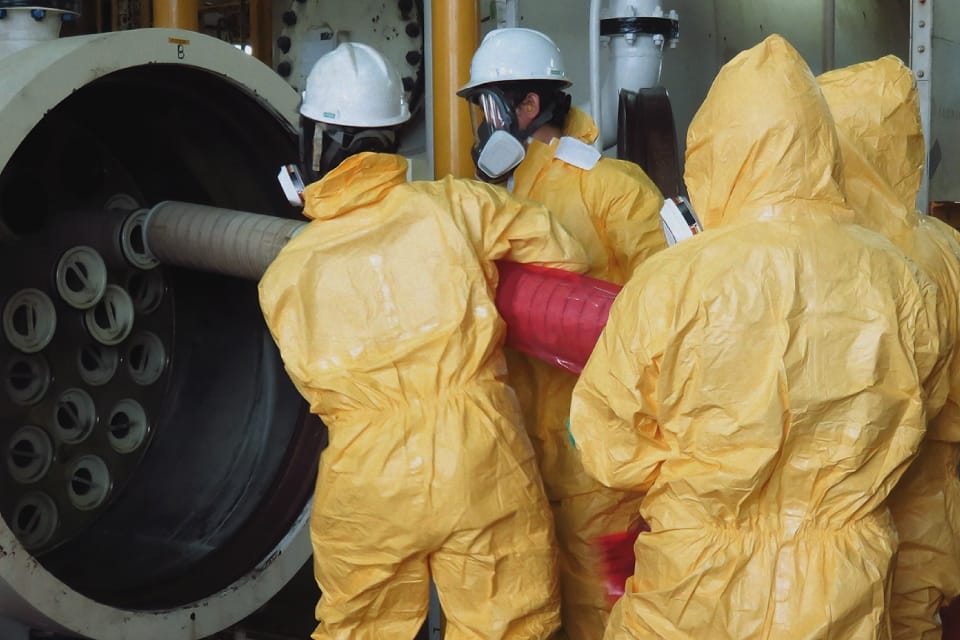
Hazmat Training for Operator Qualification: 15 Reasons Why You Need It

Properly handling hazardous materials (“hazmat”) is critical for worker safety, making it a key component of operator qualification for anyone encountering dangerous substances. To ensure employees and contractors alike are ready for this task, hiring clients must provide them with the proper hazmat training to comply with Operator Qualification regulations.
This article briefly explains the hazmat training concept and lists 15 reasons why it is a critical component to comply with operator qualification regulations.
What is Hazmat Training?
Hazmat training covers various topics, each critical to safely and effectively handling hazardous materials, from identifying potentially dangerous substances to understanding Material Safety Data Sheets (MSDS). The depth and breadth of this training are essential to comply with Operator Qualification regulations and prepare workers for any scenario they may encounter.
15 Reasons Why Operator Qualification Includes Hazmat Training
1. It Enhances Safety on High-Hazard Worksites
The underlying goal of hazmat training is to protect all individuals near harmful substances on the job site. Permanent exposure to hazardous substances poses a grave threat to the health and safety of personnel handling such materials, potentially resulting in fatalities.
Proper training teaches operators secure handling protocols, optimal utilization of protective gear, and effective emergency response strategies, mitigating the likelihood of accidents and promoting a more secure job site.
2. It Helps Operators Develop Cross-Functional Skills
Hazmat training helps operators develop skills that are valuable across various operational areas. For example, risk assessment, emergency response, and the proper use of personal protective equipment (PPE) are vital practices under multiple circumstances.
3. It Fosters Environmental Responsibility
Mishandling hazardous materials can result in severe environmental consequences. Significant ecological harm can result from spills, leakage, and improper disposal, all of which can contaminate the air, water, and soil. As such, hazmat training should include information on minimizing environmental risks via proper storage, transportation, and disposal methods.
4. It Helps Companies Comply with Regulations
Adhering to local, national, and international regulations is essential when dealing with hazardous materials. Rules established by regulatory bodies such as the Pipeline and Hazardous Materials Safety Administration (PHMSA) and the European Agreement concerning the International Carriage of Dangerous Goods by Road (ADR) outline specific hazmat training and operation protocols all hiring clients must follow.
Failure to comply may result in significant legal ramifications, such as monetary penalties, sanctions, or even the termination of business activities.
5. It Provides Efficiency and Economic Benefits
Operators who receive adequate training typically handle hazardous materials more efficiently, resulting in streamlined and more seamless operations. Proper training reduces the probability of expensive mishaps and unnecessary loss of materials. As such, investing in comprehensive hazmat training can yield substantial long-term cost reductions for organizations.
6. It Promotes Responsibility and a Safety Culture
Companies cultivate safety cultures through workforces well-trained in hazardous material management. This culture extends beyond implementing individual safety measures and incorporates shared accountability for the welfare of all workers and the environment. Fostering such a culture can mitigate workplace incidents and encourage a more conscientious approach to managing hazardous substances.
7. It Reduces Liability and Insurance Premiums
Properly trained operators handling hazardous materials can lead to fewer accidents and claims, reducing liability and lowering insurance costs. Insurance providers often favor organizations committed to safety training and may offer better terms.
8. It Provides Emergency Preparedness Training
When a hazmat incident occurs, an operator with adequate training becomes indispensable. Hazmat training encompasses disaster preparedness and emergency response, equipping operators with the ability to address crises effectively. This training is critical for safeguarding lives, property, and the environment by mitigating the effects of incidents involving hazardous materials.
9. It Teaches Specific Handling Procedures
Different hazardous substances require unique protocols for both handling and storage. Hazmat training provides operators with precise information regarding these prerequisites, which is critical for upholding the integrity of materials and guaranteeing general safety.
10. It Helps Companies Uphold Industry Standards
Several industries have set up best practices and standards for managing hazardous materials. Training guarantees that operators stay updated on these standards, helping them keep professionalism in their respective fields of work.
11. It Encourages Continuous Learning and Adaptation
The hazardous materials management field is dynamic, characterized by evolving regulations, emerging technologies, and changing best practices. Regular and up-to-date hazmat training ensures operators can adapt to these changes and integrate new techniques into their operations.
12. It Boosts Worker Morale and Retention
Investing in operator training, specifically in critical areas like hazmat handling, can profoundly improve worker morale and job satisfaction. It shows the organization’s dedication to its operators’ professional growth and well-being, often resulting in a more engaged and committed workforce and increased retention.
13. It Builds Public Trust
Businesses are responsible for handling hazardous materials for their employees, the public, and the environment. Extending through biohazard training signifies an organization’s dedication to ensuring safety and upholding corporate accountability. This dedication fosters confidence and trust among external parties in the organization’s activities.
14. It Facilitates Cross-Border Operations
Understanding and following international regulations and standards for hazardous materials is essential for companies involved in international trade or operations. Hazmat training that covers these international considerations can help create smoother cross-border operations.
15. It Promotes Future Growth
Hazmat training lays the groundwork for subsequent expansion and development. The complexities and quantities of hazardous materials managed may escalate as the company grows, and an adequately trained workforce is more adept at managing this expansion safely and effectively.
Proper Hazmat Training Requires the Best OQ Solution
Hazmat training is an essential component to comply with Operator Qualification regulations. It includes extensive competencies and understanding vital for securing, effectively, and regulatory management of hazardous substances. Investing in ongoing and comprehensive hazmat training is essential to safeguard the environment, maintain high standards of dangerous materials management, and ensure employee safety.
However, providing your workers with the best hazmat training as part of your Operator Qualification training requires the industry’s best solutions to manage all aspects of your OQ program.
Consider partnering with us to configure an OQ solution that meets your operators’ needs.
Contact us today to learn more.




